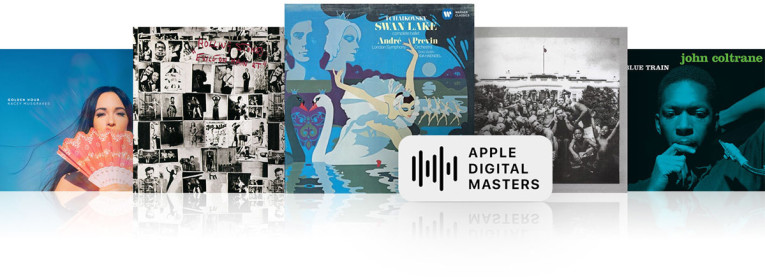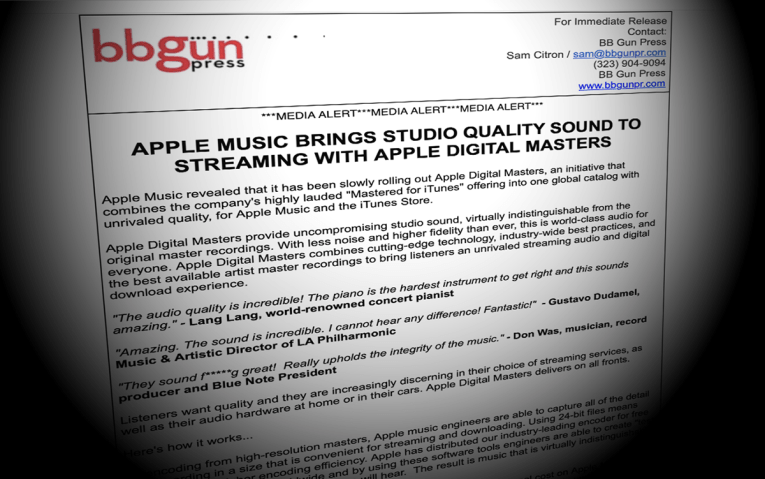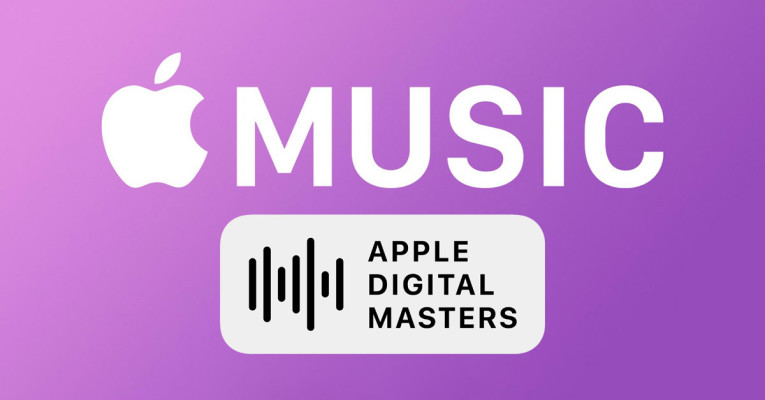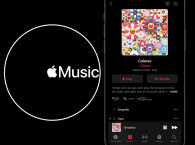It all started with an article from Billboard that stated: "On Wednesday (August 7) Apple Music announced the launch of Apple Digital Masters, a new initiative by the streaming giant that combines all of its "Mastered for iTunes" offerings into one global catalog. This is the company's first public acknowledgement of the initiative, which it has been quietly unveiling for some time."
And suddenly the story was all over the place. But there was one small detail. Apple didn't actually announce anything. Or at least, there was no official press release from Apple to be found confirming the story. All the media simply quoted the Billboard article and Apple's quotes in the story. Very unusual.

But actually, there was a press release in our editorial inbox with that story from the same day (August 7). Not from Apple, but from a music artist press agency (BBGun Press) stating: "Apple Music Brings Studio Quality Sound to Streaming with Apple Digital Masters." The release actually says "Apple Music revealed..." and quoted some of their own artists like world-renowned concert pianist Lang, music director Gustavo Dudamel, and record producer Don Was, saying "The audio quality is incredible" - and it was not clear at all what they were talking about. Apart from that, the "press release" was strange because it was distributed talking about "Apple Music" and it was hastily edited, using dubious copy-and-pasted text from different sources (from Apple and even MQA's marketing documents), in an effort to describe what the new Apple Digital Masters "thing" actually was. This was clearly not something from Apple.
The reason why I even mention it (I assume that a lot of the rumors on the Internet were amplified or even generated by this "release") was a sort of "Apple statement" at the end saying: "Apple Digital Masters provide premium quality audio without any additional cost on Apple Music and the iTunes Store. All former "Mastered for iTunes" songs will continue to be available under the Apple Digital Masters program."
And an "additional background" note stated that "Most of today's top releases are from Apple Digital Masters. About 75% of the Top 100 songs in the US and 71% of Top 100 globally are created from Apple Digital Masters."
We couldn't find the source document for those statements.
So, what was this all about?
In reality, "the announcement" (if there ever was one apart from the BBGun document) has to do with the fact that Apple decided to create a new designation - "Apple Digital Masters" - to identify its vast catalog of music, which was delivered according to its "Mastered for iTunes" (MFiT) specifications, a set of procedures for mastering engineers to follow. And the main reason for the change, which happened a few weeks ago, has to do with Apple's publicly stated intention of retiring the existing iTunes app and all "iTunes" references from its products.

Since its release in 2012, mastering studios and record labels submitting music for Apple's catalog (files for iTunes downloads and Apple Music streaming) have been applying the MFiT specifications. In Apple's updated note, available here, it clearly says: "Apple Digital Masters" replaces "Mastered for iTunes" as the name of the program to better reflect the fact that these audio advantages are available to our entire music catalog across the Apple ecosystem, whether streamed or downloaded. All "Mastered for iTunes" releases are now badged as "Apple Digital Masters." All of the "Mastered for iTunes" software tools are still usable for "Apple Digital Masters" creation.
Apple announced it is replacing the iTunes app when the new batch of operating system updates (iOS 12, macOS Catalina, the new iPad OS, etc.) will be released later this year (Fall 2019). During its WWDC 2019 keynote event, Apple announced it will be finally retiring the complicated and cumbersome iTunes application with new cross-platform software called simply Apple Music - with some of its current features also migrating to the Apple TV app, the new dedicated Podcast app, and even the OS itself (synchronizing devices).

Nothing else changes in terms of functionality, with users still being able to use Apple Music to manage their own downloaded library, apart from streaming music. Apple Digital Masters is just a name change for all music files that comply with those Best Practices (an industry standard), now labelled to help users to clearly identify those files that offer the best possible quality available in the service.
According to the specifications, files submitted to Apple should be only 24-bit PCM (uncompressed) sources, with no upsampling applied (this is easily detected). If a file only exists in 16-bit @44.1 kHz (which means only the CD master exists and the analog master was probably lost or isn't available), that's it - the file is not "labelled" Apple Digital Masters. 44.1 kHz is also the minimum sampling frequency that should be applied to a submitted 24-bit digital master. If an analog master is available, Apple (and the industry) recommends creating a new 24-bit digital master. The large majority of recorded material submitted today for these services are AIFF or WAV files at 24-bit/48kHz or 96 kHz - including those remastered from analog originals.
Of course, Apple distributes the more than 50 million music titles in its catalog exclusively in AAC (m4a) format, currently at 256 kbps. And the quality is excellent, because for the encoding process Apple also supplies a set of software converter and encoder tools so that mastering studios can control the process and preview the final result, which includes its own set of loudness normalization tools. But the reality is, Apple is actually storing the "originals," including the high-resolution audio material at 24-bit, and those are what are now labeled to the consumer as Apple Digital Masters.
By creating an earlier set of specifications and Best Practices for delivering masters, Apple is now able to identify the best possible quality they hold in the catalog. Now, the question is, will Apple ever deliver that Digital Masters music catalog with lossless compression (FLAC or ALAC ...or even MQA)? And that's what everyone assumed was being announced with the rumor generated by the Billboard/BBGun story.
Apple apparently is ready to do it, and paved the way for its users to be aware of the options. Maybe it will come with the new OS updates this Fall. We just need to hear it straight from the horse's mouth.
This text was originally published in The Audio Voice weekly newsletter. To receive it, register here.








